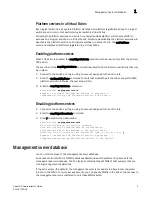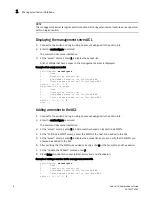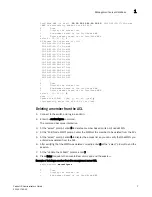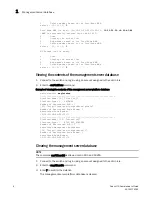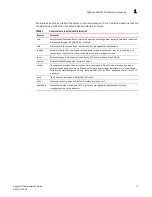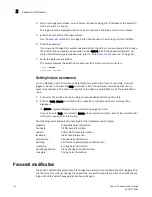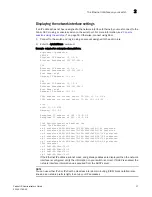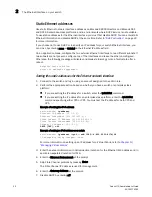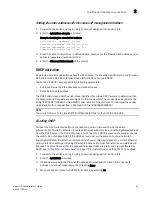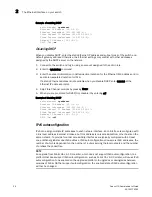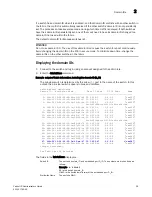
16
Fabric OS Administrator’s Guide
53-1001763-02
Fabric OS command line interface
2
Although many different software and hardware configurations are tested and supported by
Brocade Communications Systems, Inc., documenting all possible configurations and scenarios is
beyond the scope of this document. In some cases, earlier releases are highlighted to present
considerations for interoperating with them.
The hardware reference manuals for Brocade products describe how to power up devices and set
their IP addresses. After the IP address is set, you can use the CLI procedures contained in this
guide. For additional information about the commands used in the procedures, see online help or
the
Fabric OS Command Reference
.
Fabric OS command line interface
Fabric OS uses Role-Based Access Control (RBAC) to control access to all Fabric OS operations.
Each feature is associated with an RBAC role and you will need to know which role is allowed to run
a command, make modifications to the switch, or view the output of the command. To determine
which RBAC role you need to run a command, review the section
“Role-Based Access Control
(RBAC)”
on page 84.
NOTE
When command examples in this guide show user input enclosed in quotation marks, the quotation
marks are required.
Console sessions using the serial port
Note the following behaviors for serial connections:
•
Some procedures require that you connect through the serial port; for example, setting the IP
address or setting the boot PROM password.
•
Brocade 48000 director and Brocade DCX and DCX-4S enterprise-class platforms: You can
connect to CP0 or CP1 using either of the two serial ports.
Connecting to Fabric OS through the serial port
1. Connect the serial cable to the serial port on the switch and to an RS-232 serial port on
the workstation.
If the serial port on the workstation is RJ-45 instead of RS-232, remove the adapter on the end
of the serial cable and insert the exposed RJ-45 connector into the RJ-45 serial port on
the workstation.
2. Open a terminal emulator application (such as HyperTerminal on a PC, TERM, TIP, or Kermit in
a UNIX environment), and configure the application as follows:
•
In a Windows environment enter the following parameters:
Parameter
Value
Bits per second
9600
Databits
8
Parity
None
Stop bits
1
Flow control
None
Summary of Contents for 53-1001763-02
Page 1: ...53 1001763 02 13 September 2010 Fabric OS Administrator s Guide Supporting Fabric OS v6 4 0 ...
Page 4: ...iv Fabric OS Administrator s Guide 53 1001763 02 ...
Page 24: ...xxiv Fabric OS Administrator s Guide 53 1001763 02 ...
Page 28: ...xxviii Fabric OS Administrator s Guide 53 1001763 02 ...
Page 32: ...xxxii Fabric OS Administrator s Guide 53 1001763 02 ...
Page 40: ...xl Fabric OS Administrator s Guide 53 1001763 02 ...
Page 42: ...2 Fabric OS Administrator s Guide 53 1001763 02 ...
Page 54: ...14 Fabric OS Administrator s Guide 53 1001763 02 High availability of daemon processes 1 ...
Page 74: ...34 Fabric OS Administrator s Guide 53 1001763 02 Basic connections 2 ...
Page 102: ...62 Fabric OS Administrator s Guide 53 1001763 02 Audit log configuration 3 ...
Page 214: ...174 Fabric OS Administrator s Guide 53 1001763 02 Management interface security 7 ...
Page 228: ...188 Fabric OS Administrator s Guide 53 1001763 02 Brocade configuration form 8 ...
Page 276: ...236 Fabric OS Administrator s Guide 53 1001763 02 Creating a logical fabric using XISLs 10 ...
Page 404: ...364 Fabric OS Administrator s Guide 53 1001763 02 ...
Page 440: ...400 Fabric OS Administrator s Guide 53 1001763 02 Performance data collection 17 ...
Page 480: ...440 Fabric OS Administrator s Guide 53 1001763 02 F_Port masterless trunking 19 ...
Page 494: ...454 Fabric OS Administrator s Guide 53 1001763 02 Buffer credit recovery 20 ...
Page 574: ...534 Fabric OS Administrator s Guide 53 1001763 02 Hexadecimal overview E ...




